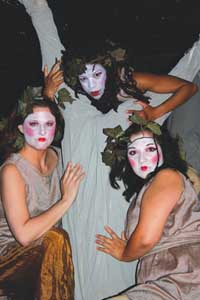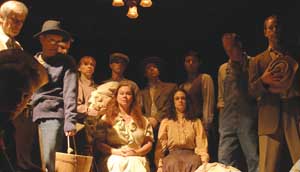-
- Calif. diocese snubs Episcopal Church, moves toward break
- Man former N.J. governor identified as lover says he believes McGreevey isn’t gay
- Obama discusses sexuality, spirituality at AIDS conference
- Same-sex marriage ban goes before Massachusetts high court
- For gay activists, it’s still political season in N.J.
- Virginia appeals court: Vt. has say in lesbian custody battle
- National News Briefs
- World News Briefs
Arts & Entertainment
The possessed and the dispossessed
Published Thursday, 07-Dec-2006 in issue 989
The Bacchae
That Dionysus was some stud. But then, consider his birth: dad Zeus yields to mortal wife Semele’s pleas to reveal himself; the resulting thunderbolt kills her; Zeus takes the unborn child and harbors it in his own thigh until it comes to term.
Then he grows up to start a “religious” cult that promotes wine, excess and orgiastic abandon. Its force-of-nature approach, popular with women, slaves and others among the disaffected, gains favor mostly in Asia Minor, where Dionysus not only gets the hot babes but also top billing as a god. What a guy.
In Euripides’ The Bacchae, Dionysus (Daniel Heath) serves both as narrator and (in disguise) as participant. Seeking to expand his influence, Dionysus decides his hometown, Thebes, would be a good place to initiate his cult in the West. Geezers Cadmus (Rhys Green) and the blind seer Tiresias (Gerard Maxwell) approve, even claiming renewed vigor from the frenzied rites.
The fly in the ointment is Dionysus’ cousin, the straight-arrow Theban king Pentheus (Kevin Koppman-Gue), who does not want those unruly Dionysians raging through his city. He imprisons the frenzied adherents and his disguised cousin as well, which seals his fate (and a particularly brutal one it will be). Dionysus, who describes himself as both “most terrible” and “most gentle,” certainly proves himself to be the former.
The Bacchae plays through Dec. 23 at 6th @ Penn Theatre, directed by Douglas Lay. Lay directs a fine cast headed by Heath and Koppman-Gue, including fine supporting performances from Maxwell, Green and Bonnie Stone as Pentheus’ mother, Agave, who finds herself drawn to the Dionysians, and will pay dearly for it. My one cavil is the over-the-top trio of Dionysians acting as chorus, who reminded me a bit of Macbeth’s “weird sisters.”
The Bacchae is about religion and state, dedication and excess, revelation, revenge and family rivalry. The current production is particularly good at pointing up the extremes, helped immensely by Marianne McDonald’s magnificently accessible translation.
Where should we draw the line between freedom and civil order? Religious fanaticism always seems to lead to disaster, but the same could be said of repression and over-permissiveness of any kind. That Greek goal of moderation is no easier to find today than it was then.
Euripides wrote this, his last play, during voluntary exile in Macedonia while Athens was engaged in the protracted Peloponnesian War, which eventually would dismember the Athenian state. The play was produced posthumously.
The Bacchae doesn’t get the press of Euripides’ earlier plays, but this production, boasting fine performances and food for thought, is a step toward remedying that.
The Bacchae plays through Dec. 23 at 6th @ Penn Theatre. Shows Thursday through Saturday at 8:00 p.m. and Sunday at 2:00 p.m. For tickets, call (619) 688-9210 or visit www.sixthatpenn.com.
The Grapes of Wrath
John Steinbeck’s classic novel The Grapes of Wrath won a Pulitzer Prize in 1940 for its depiction of migrant farm workers and their problems in California. Now, Ion Theatre presents Frank Galati’s stage version through Dec. 11 at the Tenth Avenue Theatre, directed by Claudio Raygoza.
The Grapes of Wrath is the story of the Joads, a family of tenant farmers in Oklahoma, pushed off “their” land by poor agricultural practices and a sustained drought that caused the Dust Bowl.
When hothead Tom Joad (Andrew Kennedy) returns home on parole after a stretch in the slammer for murder, he finds his family at his uncle’s place and hears that the lot of them are about to embark on the long trip to California in a rickety old truck. A flyer has circulated promising farm jobs for 800 pickers, and since they are now homeless, this looks a good bet.
So they load up the truck and become part of society’s dispossessed – the thousands hoping for a decent life in the orchards of California. What they find is hostility, harassment, unpleasant living conditions and starvation wages – and the understanding that they must either put up with the humiliation or risk loss of job (or worse) if they dare to speak up.
Former preacher Jim Casy (Matt Scott), described as having “too long a pecker for a preacher,” appears throughout the play as a sort of Greek chorus/Christ figure (note his initials) who makes the philosophical points about right and wrong. Casy joins the Joad odyssey, eventually becoming an early organizer who stands up to the grower/police cabal and demands better wages and working conditions for the workers.
Raygoza has done an incredible job of staging this demanding piece. The major feat is a big, ramshackle open Okiemobile of a truck which either has to move or be capable of disassembly for other scenes. It’s the latter here, and a fabulously ingenious piece of work.
This play also requires a large cast (23-plus musicians) and several exceptional actors in pivotal roles. My favorites are the always reliable Dana Hooley (who never fails to move me, no matter the role) as Ma Joad and Scott as Casy. But fine performances are also turned in by William Tanner as Pa Joad, Tim Schubert as Al Joad and Walter Ritter in a variety of roles. Kennedy’s Tom Joad is a little stiff and needs to find a few more facial expressions. He seems to use only one.
The Grapes of Wrath is a tribute to the indestructible human spirit and the ability of the downtrodden to keep going. You may tear up a bit when Grandpa (Ed Eigner) – who wants to “squish a bunch of grapes” on his face – dies, and agree with Casy’s funeral oration for him: “If I was to pray, it would be for the folks still alive who don’t know which way to turn.” But Ma Joad will make you believe it when she says, “They ain’t gonna wipe us out.”
The Grapes of Wrath plays through Dec. 11 at the Tenth Avenue Theatre, located at 930 10th Ave. Shows Monday at 7:30 p.m., Wednesday through Saturday at 8:00 p.m. and Sunday at 2:00 and 7:00 p.m. For tickets, call (619) 374-6894 or visit www.iontheatre.com.
And speaking of the dispossessed…
In a cruel and ironic twist of fate, Ion Theatre itself has just lost its space because of recent permit and improvement requirements that the theater can’t afford. This is the latest in a sad series of performance space losses by small theaters.
Ion is now in the market for another space. Is there an angel out there who is interested in supporting theater in San Diego? If so, and you’d like to help save this fine theater (and possibly others who were sharing their space) from homelessness, please e-mail claudio@iontheatre.com or glenn@iontheatre.com.
|
|
Copyright © 2003-2025 Uptown Publications




